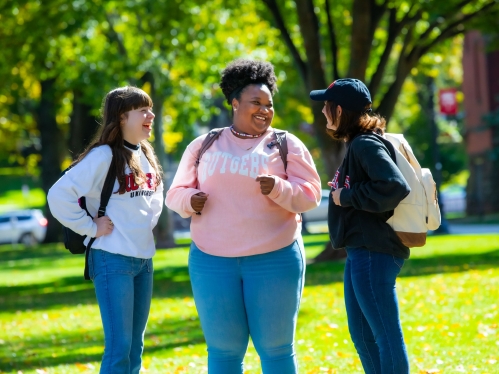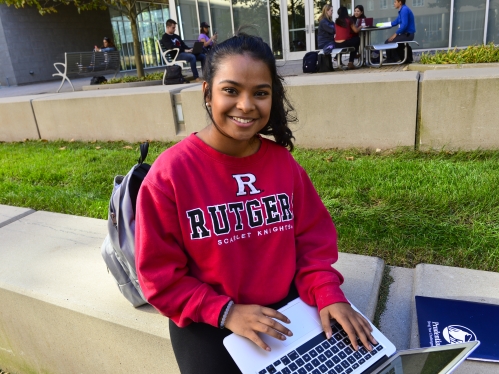
Latina/o/x Initiatives for Service, Training, and Assessment (LISTA) Certificate
Latina/o/x Initiatives for Service, Training, and Assessment (LISTA)
Rutgers’ Master of Social Work (MSW) Certificate Program in Latina/o/x Initiatives for Service, Training, and Assessment (LISTA) was designed to give future practitioners the ability to provide culturally informed and responsive services to Latina/o/x populations.
According to the U.S. Census Bureau’s 2021 estimates, approximately 20.9% of New Jersey’s population and 28.9% of New York City’s population are Latina/o/x. As these communities grow, knowledgeable social workers who specialize in serving them will see career opportunities across a variety of sectors such as healthcare, schools, family services, local government, and more.
Earning a LISTA certificate alongside your MSW degree ensures you can practice evidence-based, culturally responsive strategies that benefit the lives of Latina/o/x populations in the greater NYC area and beyond.
Watch as alumna Francesca Baroni shares her experience as a LISTA student and how it prepared her for her career, and view a video of the inaugural Puerto Rico study abroad experience.

Program Information
The MSW Certificate in LISTA aims to meet the need for social work practitioners trained in issues and contexts specific to Latina/o/x populations. You’ll learn to adapt evidence-based interventions and assessments for social work practice with Latina/os. In addition, you will learn about new models of culturally informed practices with Latina/os. The LISTA Certificate program builds these skills through real-world experience:
- LISTA requires four courses to provide education on effective, culturally responsive social work practice:
- Latinos: Culture, Community, and Social Welfare
- Social Work Practice with Latinos
- Advanced Clinical Practice: Behavioral Health with Latinos (required for students with a clinical specialization)
- You may choose from an approved list of electives as your final course (or final 2 courses if a student with a MAP specialization).
- Practicum Learning Placements in Latina/o/x serving agencies
- Experiential learning through opportunities to study abroad in Latin American countries
- Access to a community of alumni professionals for mentoring relationships through the LISTA Links mentoring initiative
Eligibility
This program in Latina/o/x social work practice can be pursued by students:
- In both the Management and Policy (MAP) or in Clinical Social Work (CSW) specialization
- In the traditional, traditional advanced standing, blended, 100% online, 100% online advanced standing, or Intensive Weekend MSW programs
- On any of the three Rutgers campuses (Camden, Newark, or New Brunswick)
- Who have enrolled either part or full time
Whether you earn your MSW online or in person, the LISTA Certificate extends your social work training and enables you to gain practical experience in providing service to Latina/o/x communities.
MSW Certificate Program Curriculum
The Latina/o/x social work certificate program consists of four courses that also fulfill MSW requirements. Depending on your MAP or CSW specialization track, you’ll take courses that build skills relevant to your future career.
Please click here for a printable list of LISTA required courses and electives.
Social Work Practicum Learning Placements Serving Latina/o/x Communities
If you earn a LISTA social work certificate alongside your Master of Social Work, you’ll spend your practicum learning placement working for an approved agency that serves Latina/o/x populations.
Through your LISTA-specialized practicum learning education, you’ll gain hands-on experience developing your ability to engage with Latina/o/x individuals, families, and groups. You’ll also put into practice social work interventions or initiatives that aid the Latina/o/x community, interpreting the impact of sociopolitical and cultural factors while acknowledging clients and communities as experts of their own lived experiences.
LISTA Social Work Certificate Scholarships
In addition to paid assistantships and financial aid offerings through the School of Social Work, students in the LISTA Certificate program can compete for various annual scholarships and stipends.
For LISTA Certificate Policies, click here


Scholarships & Fellowships
The LISTA Certificate Program offers multiple annual scholarships and stipends directly through the School of Social Work. Awards and stipends are distributed during the fall semester and all LISTA certificate students are automatically considered to receive one of the available awards. For students seeking additional scholarship support, or who may not be eligible due to SSW procedure, are welcome to apply to any public opportunities that are available below.
To Apply
The Rutgers LISTA Certificate program enhances your skills in culturally congruent social work practice across the lifespan.
Students in the Traditional (on campus) (2-year, 3-year, 4-year, or advanced standing), Blended, or 100% Online MSW program (full-time, part-time, or advanced standing) may apply to LISTA.
Please consult the chart at the bottom of the Certificates main page for application deadlines and the link to the application.
Contact Elsa Candelario at elsa.candelario@rutgers.edu with questions.


As a certificate, LISTA requires four courses:
[549]: Latinos: Culture, Community, and Social Welfare
[503]: Social Work Practice with Latinos
[568]: Behavioral Health with Latinos (required for LISTA students with a clinical specialization)
You may choose from one (or two if in the MAP specialization) of the following courses:
[543]: Social Work Practice with Immigrants and Refugees
[546]: Spanish for Social Workers
[544]: Poverty, Inequality, Discrimination & Public Policy
[545]: Global Social Work and Social Development
[585]: Advanced Contemporary Policy: Economic Justice for Families and Communities
[594]: Environmental Justice and Social Work
[576]: Puerto Rico: Compounding Disasters and Community Resilience (spring elective with embedded study abroad over spring break)
[5XX]: Study Abroad to Mexico (over winter break)
Browse the list below for descriptions of each required course or download a copy of LISTA's curriculum at-a-glance to understand how these courses will fit within the MSW program and in a suggested order to take them. Students will also participate in select practicum learning placements, view the LISTA Practicum Learning Goals.
Students in the 100% Online and Blended MSW programs follow a similar curriculum but course offerings may vary based on availability and demand. Students will receive specific course registration information from their academic advisor.
LISTA Practicum Learning Goals
By the end of the practicum, LISTA students should be able to demonstrate culturally informed and responsive skills.
Course Descriptions
-
This course examines aspects of service delivery to Hispanic populations at both the macro and micro levels. Students will develop knowledge about aspects of Latino culture that are relevant to the development of cultural competency. They will develop skills in providing evidence-based culturally relevant practices in services to this group.
-
This course provides an overview of Latino peoples in the United States. It examines concepts and theories that apply to ethnicity, racial and social identity, and acculturation as they apply to the various Hispanic groups in the United States. It begins with brief histories of the major Hispanic groups and the political and social forces that provided the impetus for their location/relocation here. It continues with the cultural similarities and differences among the groups. Also to be discussed, the current social and economic condition of Hispanics and specific problems related to their status in the United States. and implications for social work. In addition, a model of viewing Hispanic identity will be presented as a basis for social work assessment and intervention.
-
This course will examine advanced social work practice with Latinos. Emphasis is on the application and adaptation of evidence-based interventions with Latino/a/x survivors of abuse and trauma, individuals with substance use disorders and/or mental illness, and individuals who identify as LGBTQ . The course analyzes the impact of immigration and migration as well sociopolitical and cultural factors on social work practice with Latinos.
View the syllabus here

Curriculum at-a-Glance
Support the LISTA Certificate Program
Make a gift to the LISTA Certificate Program or the Raymond and Fontaine Sanchez Mayers Endowed Fellowship for Social Work in Hispanic Communities to support our students.
LISTA Links
Latino/a/x Initiatives for Service, Training, and Assessment (LISTA) Certificate Program students will have the opportunity to be voluntarily paired with Rutgers Latino/a/x Social Work alumni through the LISTA Links mentoring program. This program will help to strengthen the networks of LISTA students and alumni. It is expected that students will engage in learning-based relationships with alumni that contribute to their professional development, specifically in cultural awareness and responsiveness in their work with Latinx communities. In addition, Latina/o/x alumni will become positively engaged with Rutgers School of Social Work and with LISTA through their participation as mentors.
A primary goal is to provide professional guidance and support for students as they develop their skills and abilities to work with Latina/o/x communities. Mentors will provide insights about career options; offer a glimpse into career realities; suggest workshops, conferences, and professional associations; and offer an opportunity for the student to expand their professional network. Mentees and mentors are matched based on a range of criteria which may include career interests, geographic location, and personal preferences. An information session for mentees will be held via Zoom at the start of the Fall semester to review expectations and to answer any questions. You will receive the zoom link prior to the session.

Seeking Agencies for MSW Practicum Opportunities
Rutgers School of Social Work is seeking agencies that would like to provide practicum opportunities and stipends for MSW students, many bilingual, who have special training in working with Latina/o/x and Spanish-speaking populations.
If you would like to provide a sponsored MSW practicum for a LISTA student, please contact Elsa Candelario at elsa.candelario@rutgers.edu.
Community Advisory Board
The Rutgers School of Social Work maintains a community advisory board for its LISTA Certificate Program. Board members play a critical role in ensuring the LISTA curriculum reflects the dynamic needs of the Latina/o/x communities and continues to grow the skills of culturally responsive social work practitioners.
-
Dr. Sheila Borges Rajguru is Director, Research Development & Strategy at Rutgers. She leverages her multi-disciplinary 15+ year training to enhance the SSW’s sponsored programs enterprise. At Rutgers University (B.A.) and NYU (M.S.), she worked on microbiology/immunology research prior to earning her doctoral degree from Columbia University, Teachers College in K-12 STEM education. There she co-developed and implemented an intervention on how to (re)build trusting relationships between teachers and their culturally, linguistically, and economically diverse students using social capital theory as a framework. Previous positions include working as a STEM Educator/Faculty preparing the next generation of scholars, providing professional development to international educators, and serving as an engineering education investigator and program director on federal, corporate, and foundation grants.
Dr. Borges Rajguru also has served as a federal panel reviewer. Furthermore, she is an executive board member for the Northeast Association for Science Teacher Education, and has been interviewed by ABC News & 5T Jewish Times. Dr. Borges Rajguru is an invited keynote, national, and international speaker in the areas and intersection of STEM, K-12 and higher education, and Diversity, Equity, and Inclusion initiatives.
-
Dr. De La Cruz, BA in Political Science (Rider University), MSW (Rutgers University), and DSW (Rutgers University), is a Licensed Clinical Social Worker in NJ. She completed a Post-Graduate Certificate in Family Therapy at The Multicultural Family Institute, Inc. in Highland Park, NJ. Having originated from an underprivileged background and being a child of an immigrant family herself, Dr. De La Cruz’s education and work has been motivated by her desire to support traditionally underserved populations. Towards that overarching goal, she has worked with Latino advocacy nonprofit agencies. She currently serves as Executive Director for the Latino Action Network Foundation. Her clinical experience includes providing emergency screening of persons in mental health crisis at an inner city hospital, outpatient and in-home child and family therapy, and clinical consultation for nursing homes with primarily Spanish-speaking residents. In addition, she has extensive experience working in the prevention of child sexual abuse by conducting forensic evaluations, individual, group and family therapy at an intensive outpatient program for court mandated youth who have sexually abused and/or have fire setting behaviors. Currently, Dr. De La Cruz coordinates the psychological treatment of child sexual abuse survivors and their non-offending families in Hudson County, NJ. As a Practitioner Scholar, her research interests focus on systemic approaches to the prevention and treatment of sexual abuse, and the healing of intergenerational trauma in families through the use of mindfulness based psychotherapies, play therapy, multi-systemic family therapy, as well as the political empowerment of Latinos in NJ.
-
Alma dedicated her career to addressing racial equity and social justice as well as supporting grassroots community organizations, systems, and programs. She is an MSW graduate from the Rutgers University School of Social Work and a Licensed Social Worker. Currently, Alma serves as Director of Equity Ahora New Jersey.
New Jersey Health Initiatives (NJHI) works to create a healthier, more equitable New Jersey by investing in resident-led community groups and networks, rooted in racial equity, and centered on systems change. NJHI is managed through a collaborative relationship among the Community Foundation of New Jersey, the Community Foundation of South Jersey, and the Robert Wood Johnson Foundation.
-
Marlene Laó-Collins is Executive Director for Catholic Charities Diocese of Trenton, a faith-based, social impact organization that offers assistance to prevent homelessness, reduce hunger, stabilize people with mental and substance use disorders through integrated health services, address trauma and domestic violence in specialized children and family services, anti-human trafficking program, as well as legal immigration services. While predominately in Mercer, Burlington, Monmouth and Ocean Counties, there are ancillary programs in Southern New Jersey. Marlene provided leadership during arduous unprecedented times such as the Super Storm Sandy and COVID-19 pandemic. She and her leadership team remained focused on keeping the doors open for those who count on the services while also ensuring staff safety.
Before joining Catholic Charities, Diocese of Trenton Ms. Laó-Collins was director for social concerns for the New Jersey Catholic Conference, the public policy organization for the Catholic Bishops of New Jersey. In this position she made recommendations to the bishops on public policy issues; testified at legislative hearings; and worked collaboratively with numerous state agencies and statewide advocacy groups on affordable housing, public assistance, poverty, child care, child welfare, health care and immigration. Marlene had 10 years of experience in state government, where she was involved in assisting in the management of state run programs such as Medicaid and welfare, and overseeing reforms in health care access for the poor, public assistance, child care and other programs.
Ms. Lao-Collins served on numerous boards: Trenton Board of Education, NJ Advocacy Network to End Homelessness; St. Francis Medical Center, Trenton; the NJ Regional Equity Coalition; the Anti-Poverty Network of NJ; and the NJ Immigration Policy Network. She was co-founder and member of the Mercer County Hispanic Association and the Latina Women’s Council. She currently serves as Vice Chair on Catholic Charities USA Board of Directors and on the Board of Robert Wood Johnson University Hospital, Hamilton.
Marlene’s greatest blessing was to be married to Michael Collins for 36 year, before he passed away May 4, 2019 and to be mother to two sons, Eric Michael and Abraham Francis.
She earned a B.A. in Business Administration from Rutgers University in New Brunswick and honorary degree of Doctor of Public Service from Georgian Court University (2021)
-
Dr. José Laureano is a seasoned professional in higher education in New Jersey, boasting nearly 25 years of experience. He currently holds the position of Vice President for Student and Enrollment Services at Middlesex College. Dr. Laureano earned his Doctorate in Educational Leadership from Rowan University’s College of Education, where he focused his research on Hispanic Serving Community Colleges in New Jersey and the creation of a culturally engaged campus environment for Latino/a/x students. Additionally, he is a two-time graduate of Rutgers University, where he obtained a Bachelor of Arts in Latino and Hispanic Caribbean Studies and a Master of Social Work with an emphasis on Administration, Planning, and Policy. As a first-generation college student, Dr. Laureano was born and raised in Perth Amboy, New Jersey, and he proudly graduated from the public school system.
Dr. Laureano began his career as a Senior Counselor with the Rutgers College Educational Opportunity Fund (EOF) Program. During his time at Rutgers University, he held several positions, including Manager of Continuing Education and Global Programs, and later, Associate Director of Continuing Education and Student Services at the Rutgers Graduate School of Education (GSE). He also served as Assistant Director of Student Affairs and as an Instructor at his alma mater, the Rutgers School of Social Work (SSW). Before becoming the Vice President of Student and Enrollment Services at Middlesex College, Dr. Laureano was the Director of the Perth Amboy Satellite Center at Middlesex College.
Dr. Laureano has a long-standing commitment to building community partnerships. He has served on various boards and committees, including as the current Secretary of the Board for the Puerto Rican Association for Human Development in Perth Amboy, a member of the Advisory Board for the Center for Latino Arts & Culture at Rutgers University, and as the current Vice-Chair of the Student Affairs Affinity Group for the New Jersey Council of Community Colleges. Additionally, he is a member of the steering committee for the Latino Action Network in New Jersey. Dr. Laureano has also led initiatives focused on access, equity, and inclusion, aiming to enhance the recruitment and retention of diverse faculty, staff, and students while promoting an inclusive campus culture. -
Lisa Lawson is a nationally recognized speaker, educator, and consultant in the integrated behavioral health field. Lisa serves as Executive Director of New Jersey Clinical Consulting and is a recurring Series Leader for Rutgers Project ECHO series. Her career is distinguished by a steadfast dedication to advancing health equity through integrated healthcare practices and strategic partnership development. Lisa’s contributions include serving on several boards and councils, underscoring her commitment to improving healthcare delivery through education, collaboration, and community engagement.
Lisa has presented at and contributed to numerous organizations, including the National Council for Mental Wellbeing, NJAMHAA, NJMHI, the Latino Action Network, the Supportive Housing Association of New Jersey, the National Association of Social Workers (NASW NJ), and Rutgers University. Her work focuses on key topics such as health equity, veteran healthcare, inclusive language, and integrated care models. Among her accolades, Lisa was honored by the Clinton Global Initiative University for an international health initiative in Beijing, China, named NJAMHAA’s Mental Health Leader of the Year in 2023, and recognized as Mercer Council’s Prevention Leader of the Year in 2024.
A proud Rutgers alumna, Lisa holds degrees from the Rutgers School of Business and Rutgers Graduate School of Social Work. She maintains a strong connection to the university through Rutgers Project ECHO Clinics, a contributor to the Huamin Research Center, and the Rutgers Cancer Institute. -
Elisa Neira-Hamada is Senior Director of Health Equity for the Connecticut State’s Office of Health Strategy (OHS). In her role, Neira focuses on advancing policies, programs and initiatives that reduce health disparities, address social determinants of health and increase healthcare quality and equitable access for vulnerable communities.
Before joining OHS, Neira was Deputy Commissioner for Social Services at the New Jersey Department of Human Services, overseeing the Division of Family Development, the Commission for the Blind and Visually Impaired, the Division of the Deaf and Hard of Hearing and the Office of New Americans. Under her leadership, the Department expanded access to food assistance for families, children and college students; made significant investments in making childcare more affordable; boosted and expanded support for deaf, blind, visually impaired and deafblind individuals; and focused efforts to make New Jersey communities more inclusive for individuals with disabilities. During her tenure, Neira-Hamada led the launch of New Jersey's first State Office of New Americans to support immigrants and refugees through legal services programs, language access expansion, and outreach and education.
Before joining state government, Neira worked in local government as Director of Human Services in Princeton administering income-assistance and emergency housing services. She played a key role in leading Princeton’s welcoming community efforts and was recognized for her work in building positive relationships between police and immigrant communities. Neira also led the development and implementation of Princeton’s first Community Needs Assessment to identify needs and service gaps of low-to-moderate income households.
Neira’s professional experience also includes working with adults with intellectual and developmental disabilities in community residential and day program settings and deaf, hard of hearing, blind, visually-impaired and deaf-blind individuals. She has a Bachelor of Arts in Social Work and Spanish Translation and Interpreting from Rutgers University and a Master of Social Work from Fordham University. She is a former Welcoming America fellow; serves on the board of the Rutgers School of Social Work Latino Initiatives for Service, Training and Assessment (LISTA); and the West Hartford’s Advisory Commission for Persons with Disabilities.
A native Spanish speaker, she was born in Ecuador and raised in Salem County. She now resides in West Hartford, Connecticut with her family.
-
A graduate from Rutgers University with a BA in Psychology; Attended New York University where she received her Master Degree in Clinical Social Work; Received her Ph.D. in Clinical Social Work from the International University for Graduate Studies.
She has been an employee of PROCEED for the past 31 years. She has been a director for several programs including the pre-school programs, Child Abuse Prevention, Youth Counseling, Differential Response, Outreach to Adolescents at Risk and the Substance Abuse Programs. She has 36 years of experience working with families, children, and adolescents. Areas of expertise include domestic violence, child sexual abuse, family therapy, substance abuse, HIV/AIDS, and clinical supervision.
-
Katty Rivera, MEd, is a Training and Consultation Specialist at The Boggs Center on Disability and Human Development. She provides training and technical assistance to schools involved in the NJ Positive Behavior Support in Schools project, a partnership between the New Jersey State Department of Education, Office of Special Education Programs, and The Boggs Center.
Katty has extensive experience in education, behavioral health, training, and workforce development. She has previously coordinated regional mental health training initiatives and programs for a federally funded technical assistance and training center. Katty has led the design and delivery of evidence-based professional development programs, created resources for educators and behavioral health providers, and developed targeted professional development plans based on implementation science. Her bilingual skills have supported culturally responsive training efforts, particularly in areas such as suicide prevention, trauma-informed care, provider self-care, burnout prevention, wellness, and Latinx mental health.
Katty has collaborated with local, regional, and national partners throughout her career to develop training curricula, facilitate training sessions and consultations, and enhance organizational capacity for sustainable practice changes. Her research interests include program implementation and evaluation, culturally informed trauma practices, and improved occupational health and wellness.
Katty holds a master's degree in counseling psychology from the Rutgers University Graduate School of Education and is a doctoral student in Organizational Psychology at the Rutgers University Graduate School of Applied and Professional Psychology. There, she continues to explore strategies for improving organizational wellness, learning, professional development, and sustainable outcomes through evidence-based systems change. -
Raymond Sanchez Mayers is a Professor Emeritus in the School of Social Work and an affiliated faculty member of the Department of Latino and Hispanic Caribbean Studies.
Dr. Sanchez Mayers is the founder and former director of Latino/a Initiatives for Service, Training, and Assessment (LISTA). The goal of this certificate in the M.S.W. program is to prepare social workers to provide services in a culturally sensitive manner to Hispanic populations, individual, family, and community. It was developed to meet the needs of Latinos in the State of New Jersey and beyond. Courses offered through the certificate program, along with internships in Hispanic-serving agencies provide the background, knowledge, and skills to work with this expanding population. He has authored four books, including Hispanic Substance Abuse and Financial Management for Nonprofit Human Service Organizations. His work has appeared in Journal of Family Relations, Journal of Drug Issues, Children and Youth Services Review, Prevention Science, and other publications. He has also presented papers at many professional conferences on issues related to Latinos.
Dr. Sanchez Mayers received the Rutgers School of Social Work’s Innovative and Creative Teaching Award in 2017 as well as the Sage/CSWE 2017 Commission on Research Faculty Award for Innovation in Research Instruction.
On a personal note, Dr. Sanchez Mayers plays chess online and is one of the top 100 correspondence chess players in the U.S.
-
Maria Vizcarrondo is the retired President and CEO of the Council of New Jersey Grantmakers. Prior to this, she was Director of Community Development and External Relations at Cabrini University in Philadelphia. She was inaugural Executive Director of the school’s Nerney Leadership Institute, launched in 2013.
Ms. Vizcarrondo brings more than 25 years of experience transforming service organizations and has served her communities as both an appointed and elected official.
In 2006, when he was first elected Mayor of Newark Cory Booker tapped Ms. Vizcarrondo to head Newark’s Health and Human Service Department, the largest of its kind in New Jersey. One of her first actions in that role was to develop a Children’s Bill of Rights to benchmark improvements in the lives of children and families throughout the city. Her accomplishments included securing state funding to establish Family Success Centers to provide neighborhood-based services, and launching a major citywide campaign to raise the immunization rates of Newark’s children.
Prior to her mayoral appointment, Ms. Vizcarrondo served as the first woman president and CEO of United Way of Essex and West Hudson. Her pioneer work in re-engineering the organization’s mission into community building was documented in the United Way Transformation Diaries. In the aftermath of the 9/11 attacks, Ms. Vizcarrondo led the New Jersey United Ways in a statewide coordination of services for affected families and managed the distribution of corporate funding for these efforts.
She was elected Essex County Surrogate in 1993 and served four years of a five-year term before leaving to join United Way.
Ms. Vizcarrondo has been listed among the “100 Most Influential People in New Jersey” and was a founding member of the New Jersey Institute for Social Justice. -
